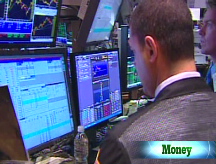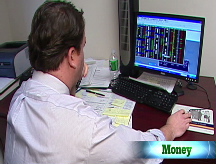Stocks: Winning streak ends
Recession fears snap a four-session rally for the S&P 500 and the Nasdaq.

NEW YORK (CNNMoney.com) -- Stocks tumbled Thursday, with the Nasdaq and S&P 500 breaking a four-session winning streak, following more dire news on earnings, housing and employment.
Friday's big news of note is the advanced reading on fourth-quarter gross domestic product growth (GDP). GDP is expected to have plunged 5.4% from a year ago, making the quarter the worst in over 26 years.
The Dow Jones industrial average (INDU) fell 226 points, or 2.7%. The Standard & Poor's 500 (SPX) index lost 29 points, or 3.3%. The Nasdaq composite (COMP) lost 50 points or 3.2%.
Prior to Thursday's selloff, the Nasdaq and S&P had managed a four-session winning streak. The Dow notched three straight winning days.
"We're going to remain in this very volatile period as people continue to realize that the economic reality is worse than was anticipated," said Ben Halliburton, chief investment officer at Tradition Capital Management.
"The news over the past month has been dismal when it comes to the economic stats, the layoffs and the earnings reports, and we're going to continue to see this pace of bad news for at least another few weeks," he said.
Stocks rallied through the first week of the year, plunged 14% through late last week and then managed to bounce back for a few sessions. The recent advance was predicated on optimism about the government's plan to set up a "bad bank" to take toxic assets off bank balance sheets and hopes that the economic stimulus plan would help.
But enthusiasm about the bad bank has waned, sending financial stocks tumbling Thursday, said Ron Kiddoo, chief investment officer at Cozad Asset Management.
"In this economic environment, it's hard to sustain any advance for more than a few days," he said.
Investors put money back into stock mutual funds over the past week, after withdrawing money in the previous week. For the week ended Jan. 28, investors poured $6.5 billion into stock funds, according to investment-research firm Trim Tabs. In the previous week, investors pulled $138 million out of funds.
Friday preview: After the close, online retailer Amazon.com (AMZN, Fortune 500) reported quarterly sales and earnings that topped analysts' forecasts. Shares gained 13% in extended-hours trading and were likely to drive technology gains Friday.
Oil companies Chevron (CVX, Fortune 500) and Exxon Mobil (XOM, Fortune 500), a Dow component, are both expected to report weaker quarterly earnings Friday morning.
Dow components Honeywell (HON, Fortune 500) and Procter & Gamble (PG, Fortune 500) are both expected to report higher quarterly earnings Friday morning.
In addition to GDP, Friday brings a report on manufacturing in the Midwest region along with the University of Michigan's consumer sentiment index. Both are expected to roughly hold steady from the previous month.
Economy: New home sales plunged in December to the lowest level since record-keeping began in 1963, according to a government report released Thursday. Sales fell to a seasonally adjusted annual unit rate of 331,000 in the month, down 14.7% from November and short of forecasts.
Weekly jobless claims rose to 588,000 last week, the government reported, while the number of Americans drawing benefits for a week or longer rose to the highest level on record.
A third government report showed new orders for durable goods fell 2.6% in December, falling for the fifth straight month.
Company news: The parade of weak earnings and job cuts continued.
Ford Motor (F, Fortune 500) said it lost $5.9 billion in the fourth quarter and $14.6 billion for the full year. However, the company again said it does not need the federal bailout that's already been taken by rivals General Motors (GM, Fortune 500) and Chrysler.
Ford's credit unit said it was cutting 1,200 jobs or 20% of its staff.
Employers announced thousands of job cuts each day this week, including potentially more than 13,000 Thursday. Companies impacted include photo products maker Eastman Kodak (EK, Fortune 500) investment services company Charles Schwab (SCHW, Fortune 500) and drugmaker AstraZeneca (AZN).
Late Wednesday, Starbucks (SBUX, Fortune 500) reported quarterly sales and earnings that were short of forecasts and said it could cut up to 6,700 jobs in 2009.
Dow component 3M (MMM, Fortune 500) reported weaker quarterly earnings that nonetheless topped forecasts, and warned that 2009 earnings won't meet its earlier forecast. 3M is seen as something of a proxy for the economy due to its varied businesses. The stock gained 2%. It was one of only three of the Dow 30 that ended the session higher.
Dow component AT&T (T, Fortune 500) stumbled 4.6% one day after it reported lower quarterly earnings and higher revenue, both of which missed forecasts.
Market breadth was negative. On the New York Stock Exchange, losers topped winners five to one on volume of 1.44 billion shares. On the Nasdaq, decliners beat advancers three to one on volume of 1.95 billion shares.
Obama plan: The House of Representatives passed an $819 billion economic stimulus plan late Wednesday, largely along party lines, despite President Obama's efforts to recruit support from both sides of the aisle.
The bill in its current form is set up for $607 billion in spending and $212 billion in tax cuts. However, the House vote is just the first step in a process that will take several weeks.
The Senate is debating a similar version of the bill, to be voted on next week. If both versions pass, differences would have to be resolved and both chambers would then have to vote on the new version. The goal is to get a bill to Obama to sign by mid-February. (Full story)
Bonds: Treasury prices tumbled, raising the yield on the benchmark 10-year note to 2.86% from 2.66% Wednesday. Treasury prices and yields move in opposite directions. Yields on the 2-year, 10-year and 30-year Treasurys all hit record lows last month.
Lending rates held steady. The 3-month Libor rate held steady at 1.17%, unchanged from Wednesday, according to Bloomberg.com. Overnight Libor was also unchanged at 0.22%. Libor is a bank-to-bank lending rate.
Other markets: In global trading, Asian markets ended higher, following Wall Street's lead from Wednesday. But the good cheer did not spread to European markets, which ended lower.
The dollar gained versus the euro and fell against the yen.
U.S. light crude oil for March delivery fell 72 cents to settle at $41.44 a barrel on the New York Mercantile Exchange.
COMEX gold for April delivery rose $16.50 to settle at $906.50 an ounce.
Gasoline prices rose one-tenth of a cent to a national average of $1.843 a gallon, according to a survey of credit-card swipes released Thursday by motorist group AAA.
Talkback: Get your economic questions answered. E-mail realstories@cnnmoney.com with questions about jobs, housing, energy, student loans, credit cards, Americans' spending and savings habits, etc., and they could be answered on air as part of the first CNN Money Summit. ![]()




